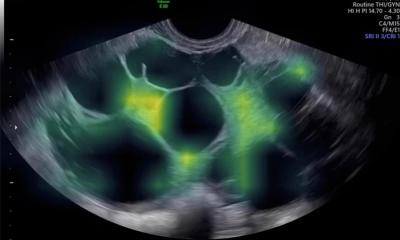
Image source: Leipzig University; photo: Benjamin Wolf
News • Total mesometrial resection (TMMR)
Cervical cancer: New surgical method brings benefits
Cervical cancer is the fourth most common malignant tumour in women worldwide. In the early stages, surgery can be of benefit to most patients.
In a comparative study including more than 1000 patients with more than 10 years of follow-up, the standard treatment for this cancer has now been compared with a new surgical method, total mesometrial resection (TMMR), developed and routinely performed at the University of Leipzig Medical Center. TMMR was associated with a significantly lower risk of disease recurrence and death. The findings were recently published in the Lancet journal eClinicalMedicine.
The data now available will contribute further to the national and international dissemination of the principle and practice of cancer surgery developed in Leipzig and cure more patients with cervical carcinoma, but also with other gynaecological cancers
Bahriye Aktas
Two decades ago, Professor Michael Höckel, then Director of the Department of Gynaecology at Leipzig University, developed a new surgical method for the treatment of cervical cancer patients: total mesometrial resection (TMMR). The method is based on the ontogenetic cancer field model, which predicts the local spreading pattern of a malignant tumour from the embryonic development of its original tissue. During the operation, tissue structures with a high risk of cancer – which are often left behind during conventional surgery – are removed. On the other hand, other structures that are important for the function of neighbouring organs, such as the urinary bladder, are spared despite their proximity to the tumour.
While conventional surgery requires subsequent radiotherapy in up to half of all cases, TMMR does not require this at all. The recently published study is the first to directly compare the Leipzig surgical method with the conventional treatment strategy. Professor Bahriye Aktas, Director of the Department of Gynaecology at the University of Leipzig Medical Center and Professor Henrik Falconer from Karolinska Institutet in Stockholm and their teams analysed 1007 women with cervical cancer who were treated between 2011 and 2020.
Advanced statistical methods were used to directly compare the data from the University of Leipzig Medical Center with that from Sweden, where the standard treatment is surgery and radiotherapy. While 91.2% of women with early-stage cervical cancer treated with TMMR continued to be tumour-free after five years, this was only the case for 81.8% of women who received conventional treatment. In the Leipzig cohort, the risk of dying from cervical cancer during the period studied was 58% lower.
“The findings confirm that our team in Leipzig is on the right track with cancer field surgery. The data now available will contribute further to the national and international dissemination of the principle and practice of cancer surgery developed in Leipzig and cure more patients with cervical carcinoma, but also with other gynaecological cancers,” says Professor Aktas.
Source: Leipzig University
16.07.2024










